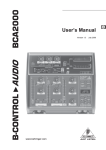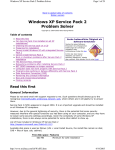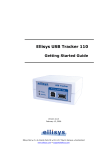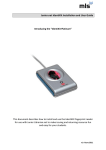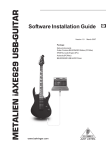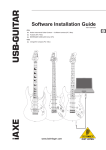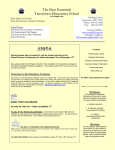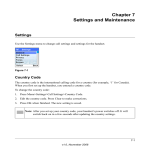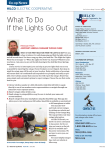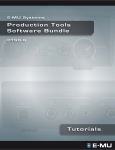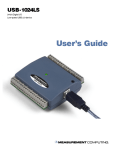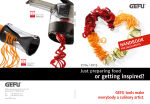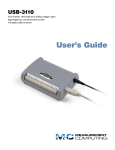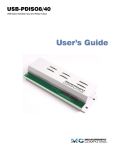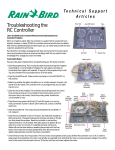Download BCA2000 V1.9.7.2beta / USB2.0 Music Applications for Windows® XP
Transcript
BCA2000 / USB2.0 and Music Applications Spezielle Studiotechnik GmbH BCA2000 V1.9.7.2beta / USB2.0 Music Applications for Windows® XP Overview : • Known issues with the original driver • Bug-fixing in the current driver V1.9.7.2beta • General suggestions and solutions regarding : • • • o Windows® XP Service Pack 2 o Virus scanner software o New installation of Windows® XP o Configuration of audio devices within Windows® XP o Simultaneous use of additional USB devices. o Use of “third-party” software tools for Windows® XP tuning Important information about USB1.1 and USB2.0 regarding o Minimum system requirements o USB2.0 chipset o System load due to “High-Speed” streaming under USB2.0 Further tips for host configuration o Power management / stepping control o Shared Memory or on-board graphic cards o ATA/ATAPI device reverts to PIO Mode Contact our Customer Support www.behringer.com BEHRINGER Spezielle Studiotechnik GmbH Seite 1 von 8 BCA2000 / USB2.0 and Music Applications Spezielle Studiotechnik GmbH Known issues with the original driver : In many cases the first version of the BCA2000 driver did not work properly. The known issues mainly affect the WAVE driver (WDM / MME) – so problems may occur under certain circumstances when recording or playing back audio material with software which is not ASIO-conform, e.g. o Windows® Media Player o WinAmp o Adobe® Audition o Real Player ....and many other „Freeware“ audio software applications. Bugfixing in the current driver V1.9.7.2beta : Driver version V1.9.7.2beta is now available for download from our website. The known bugs have been addressed in this version. The only reason for the current “beta”-status is a slight functional limitation of the WAVE driver, as detailed in the .pdf “read me” document which accompanies the driver file. We are working on a new driver with utmost priority. This driver will be a complete rebuild, an will include some additional functionality. The latest driver files can be downloaded from : http://www.behringer.com/05_support/bc_download/bc_downloads.cfm?lang=GER and when the time comes, this is where the new version will be posted. However - not all problems are related to the BCA2000 driver. In addition to the driver update, here are a few tips and solutions to eliminate the most common sources of error. Please only use Windows® XP Service Pack 2. All professional audio software applications are as reliable after the installation of SP2 as they were before. If you are already running the BCA2000 successfully under SP1 together with Microsoft®-Patch KB822603 then there is no need for you to change anything. However, the installation of SP2 will be prerequisite for the next generation driver. Hans-Georg Michna describes the upgrade to SP2 in detail under http://www.michna.com/kb/WxSP2.htm www.behringer.com BEHRINGER Spezielle Studiotechnik GmbH Seite 2 von 8 BCA2000 / USB2.0 and Music Applications Spezielle Studiotechnik GmbH Please deactivate you virus scanner Many virus scanners will continue to operate on a sub-level in the background even after being switched off. Generally this is of no consequence for audio applications, but if you are experiencing difficulties which cannot be traced to any other specific cause you may well find that de-installing the virus scanner or changing to a different one cures the problem. Clean installation of Windows® XP Over a period of time you may find that additional hardware and software has been installed but is no longer being used. Even though you may have de-installed these programs and drivers correctly, they can leave redundant files and entries floating around in the Windows® registry. This can slow down the computer and may even lead to unexpected conflicts. This sort of problem is not easy to trace. If you intend to use a laptop or PC specifically for audio applications then it is recommended to re-install the OS on a “clean” hard disk or partition, and to reserve this system purely for your audio and music applications. Connections to local networks or to the internet (also Bluetooth, WLAN) are also potential sources of trouble. If you can’t spare a dedicated PC for music, it should be possible to create a separate partition on the hard drive for music apps and file storage. Some useful advice regarding the re-installation "from scratch” of Windows® XP may be found under : http://www.musicxp.net/installing_xp.php www.behringer.com BEHRINGER Spezielle Studiotechnik GmbH Seite 3 von 8 BCA2000 / USB2.0 and Music Applications Spezielle Studiotechnik GmbH Configuration of audio devices within Windows® XP: After having installed the driver, and with the BCA2000 still connected, you should check the following settings : Start > Settings > Control Panel > Sounds and Audio Devices > Sounds Select „No sounds“ and „apply“. Start > Settings > Control Panel > Sounds and Audio Devices > Audio The BCA2000 should already be selected as the preferred device for recording and playback, but please be sure to remove the tick from the box marked „use only preferred devices“ Start > Settings > Control Panel > Sounds and Audio Devices > Hardware Highlight the BCA2000 and then click Properties > and again Properties > Choose + Audio devices 9 BCA2000 once more > Properties and place a tick in the box „do not map through this device“ Simultaneous use of additional USB Devices: Disconnect all USB devices which are not absolutely necessary for audio purposes from your computer (printer, scanner, hub). If you are experiencing problems then disconnect all additional USB devices, including those you may need to use during your session, and reconnect one by one until you have determined what was actually causing the problem. Wherever possible avoid using USB devices which create a large amount of data traffic (e.g. external HDD or DVD drives, scanners, camcorders) during a recording or editing session. www.behringer.com BEHRINGER Spezielle Studiotechnik GmbH Seite 4 von 8 BCA2000 / USB2.0 and Music Applications Spezielle Studiotechnik GmbH “Third-party” software tools for Windows® XP tuning : We do not recommend installing any form of “tuning software” for Windows® XP (such as found on CDROMs which often accompany popular PC monthly magazines). We can’t make any assumptions about their effectiveness, however they are all potential sources of configuration or performance issues. The same goes for hardware tuning (eg. overclocking the CPU etc) We do recommend referring to http://www.musicXP.net\tuning_tips.php for some particularly relevant help with optimising your Windows® XP system for music purposes. Important general information about USB2.0 and USB1.1: BCA2000 with USB1.1 You can use the BCA2000 on a computer running USB1.1 without any difficulties, however the functionality is limited by the reduced bandwidth available under USB1.1 (more details in the BCA2000 user manual). BCA2000 with USB2.0 The full functionality of the BCA2000 is only supported when using a High Speed USB connection. “High Speed USB” is the correct term for the fast data transfer rate of up to 480Mbsec. Note : the term “Full Speed” refers to the standard USB transfer rate of 12Mbsec – this is valid under both USB1.1 and under USB2.0. It has come to our attention that there are some „modern“ computers on the market which claim to offer USB2.0 capability but which are technically only capable of the slower “full speed” data transfer rate. The reason for this may be the fact that USB1.1 is no longer officially being recognised by manufacturers ! Moreover – these days it is necessary to differentiate between USB2.0 Full-Speed (approximates to the old USB1.1 standard) and USB2.0 High-Speed (the “really fast” USB with up to 480Mbsec). www.behringer.com BEHRINGER Spezielle Studiotechnik GmbH Seite 5 von 8 BCA2000 / USB2.0 and Music Applications Spezielle Studiotechnik GmbH USB2.0 is not just „fast USB1.1“ In addition to the maximum transfer rate, there are other significant differences between USB2.0 and USB1.1. Although it all looks much the same, the cables, terminals and host controllers designed for use under USB2.0 all have to meet a very different specification. The processing of an isochronous data stream (a.k.a. “streaming”) via High-Speed USB2.0 cannot be compared to the processing of a USB1.1 data stream. USB2.0 doesn’t always mix with USB1.1 See also point #5. For this reason we recommend disconnecting redundant USB devices during your session. If you suspect that your host computer may be suffering from a USB-related configuration issue, you can find more information at http://www.usbman.com/USB%202%20News.htm System-Requirements CPU speed minimum 1.2 GHz (Pentium is recommended) Windows® XP with SP2 USB2.0 is activated in the system BIOS ! A current USB2.0 Chipset (with EHCI device driver) installed 256MB RAM (512Mb are recommended for standard music applications) This does not exclude machines with slower processors, but these are far more likely to have difficulties with USB2.0 and are therefore not recommended. These conditions represent an absolute minimum for reliable operation of the BCA2000. www.behringer.com BEHRINGER Spezielle Studiotechnik GmbH Seite 6 von 8 BCA2000 / USB2.0 and Music Applications Spezielle Studiotechnik GmbH USB Chipset (EHCI Enhanced USB2.0 Controller) : We have found that the host’s USB2.0 chipset is often being blamed for performance issues in conjunction with the BCA2000. This is not always the case. There are many other factors and combinations of factors which play a role in the overall performance, some are related to the chipset, but others are not. For this reason it is impossible to associate recognised performance problems with specific chipsets or drivers. To avoid any further misunderstandings we emphasise the following : If your computer’s USB chipset is not capable of dealing with High Speed Streaming, then even our forthcoming driver will not cure the problem. If the chipset is from ca. 2002 or earlier, and you appear to be having serious problems, then perhaps you can work around this by fitting a new USB2.0 adapter card (PCI oder PCMCIA) from a brand-name manufacturer (e.g. ALi, NEC, Orange, Intel). If you do choose this option, then be sure to load the device drivers as provided by the manufacturer (wherever possible) – we are aware of several cases where the expenditure has proved to be worthwhile. System load due to USB2.0 High Speed Streaming : By its own very nature, audio-streaming via High Speed USB (up to 480Mb/s) will place heavy demands on the available system resources. In conjunction with a “thirsty” audio software application, this will lead to an increased CPU load. This cannot be compared with USB1.1. If you find that the CPU load is excessively high, then the first step is to increase the latency time in the BCA2000 control panel. The longer the latency, the lower the demands on the CPU. Depending on the capabilities of your host computer, you may find that the range of simultaneous “plug-ins” is not as extensive as it was perhaps with your last soundcard. Having said that we point out that the BCA2000 has other strengths – for example 8 tracks of audio at once, or even 4-tracks at 24bit/96kHz. BEHRINGER is aware of the increased demand on host resources as caused by high speed USB2.0, and we are doing our best to address this issue in the forthcoming driver. www.behringer.com BEHRINGER Spezielle Studiotechnik GmbH Seite 7 von 8 BCA2000 / USB2.0 and Music Applications Spezielle Studiotechnik GmbH Other points to consider : Power Management / Stepping Control in laptops. This can cause a significant reduction in performance, leading to display issues or interruptions in data transfer (crackles, temporary loss of audio) Shared Memory Graphic cards (without dedicated graphics RAM). Due to the increased drain on CPU load necessitated by continual screen updates (eg scrolling waveforms or level metering), this can also lead to performance problems on some hosts. Particularly nasty and perhaps more widespread than one would think, the automatic reassignment of the operating mode for the hard drives from DMA (UDMA) back to PIO. Windows® will do this automatically and without warning. The access time for the hard drive is critical for the continuous processing of data, and if the drive has reverted to PIO then not only does the hard drive become much slower, the load on the CPU is also increased significantly. This phenomenon is described in detail under http://www.michna.com/kb/WxDMA.htm If you have installed our latest driver on a host computer running Windows® XP with SP2, and have taken account of all of the above, then you should find that most problems will have been solved. However – if you are still unhappy with the performance of the BCA2000 on your own host computer, then feel free to take a look at the FAQs on our online support website, or contact our Customer Support directly at http://behringer-en.custhelp.com/cgi-bin/behringer_en.cfg/php/enduser/std_alp.php?sm=2 We can only help those who approach us for help ! ® ® WINDOWS , Adobe and their respective logos are registered trademarks of their respective owners. Their use neither ® ® constitutes a claim of the trademarks by BEHRINGER nor affiliation of the trademark owners with BEHRINGER . Please see our Terms of Use. © 2004 BEHRINGER Spezielle Studiotechnik GmbH www.behringer.com BEHRINGER Spezielle Studiotechnik GmbH Seite 8 von 8








